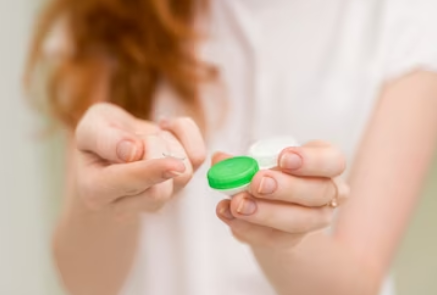What Are The Ingredients In Contact Solution?

This article will explain the truth about proper contact lens care and solutions. Unlike most popular beliefs, lens solutions are used only to store. But they are used to also clean and disinfect your contact lenses during storage.
Here are the things you need to know about contact solutions.
What is Contact Lens Solution?
Before going too deep into today’s topic, let’s look at what contact lens solutions are and what they do.

Contact solution is a chemical used to clean and store contact lenses. It cleans the lens of bacteria, germs, and debris accumulated daily. These solutions are what enable your contacts to last longer than a single use.
The contact solution cleans off pathogens and proteins that collect on the surface of the lens, ensuring that it is healthy for the next wear. Some contact lens solutions also contain hydrating properties.
What is the Contact Lens Solution made of?
Contact lens solutions are made up of some form of preservative, wetting solution, surfactant, disinfectant, saline solution, or antibiotic. The following are the ingredients in the contact lens solution.
- Preservatives: Preservatives lengthen the shelf life of your contact solution by breaking up pathogens and protein buildup. Some examples include poly aminopropyl biguanide, polyquaternium, and propylene glycol.
- Wetting solutions: This ensures that your contacts remain moistened, hydrated, and comfortable.
- Surfactants: Surfactants aid in removing debris from the lens’s surface (while not causing damage to the lens itself).
- Disinfectants: Disinfectants can kill the germs that may cause eye infections, including the major one to watch for, keratitis. The major disinfectant mix for disease control is the hydrogen peroxide-based solution.
- Antibiotic: Antibiotics are added to clean and soothe irritated or sensitive eyes. An example of antibiotic is boric acid
- Saline Solution: This is a mixture of water and sodium chloride for the stabilization of the other ingredients to keep the lenses comfortable.
6 Contact Lens Solutions you can find in a Contact Lens Case
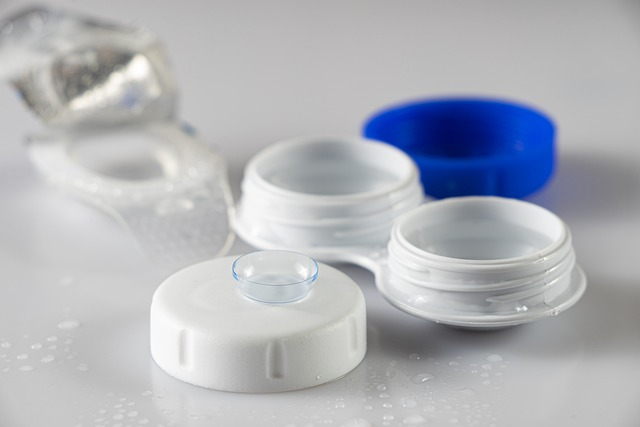
Each form of contact treatment has a specific purpose of accommodating various sorts of contacts. Certain products should never be used with specific contacts because they can damage the lens and/or harm your eyes. Here are the six major types of contact solutions.
Daily Cleaners
This is a simple treatment that is used primarily to clean contact lenses. As a result, it cannot disinfect or help store your lens.
What does cleaning entail? Only dirt and other residues are removed. Protein buildup, pathogens such as keratitis, and treatments for dry or sensitive eyes are not affected.
Saline Solution
This is another solution that does not disinfect contact lenses. This system is better for rinsing the lens after you have used another care system to clean and disinfect the contact lenses.
Some hydrogen peroxide-based systems, for example, recommend cleaning contact lenses with saline prior to installation. Consult your eye care specialist to determine whether you need to use saline with your care system.
Enzymatic Protein Removers
These removers go above and beyond regular cleaners. Enzymatic protein removers eliminate the debris that your eyes leave on your contact lenses over time. Depending on the product, they are available in liquid and tablet forms and are taken daily or weekly. Before using this product, see your eye doctor.
Multipurpose Solution for Soft Contact Lenses
A multipurpose contact solution is an all in one care technique for cleaning, rinsing, storing, and disinfecting contact lenses.
The multipurpose solution is the most popular care system among soft contact lens wearers, not to mention that the solution cleans. It is also the safe one to choose if you wish to store soft contact lenses.
The following are some things to note while using this solution:
- Rub and rinse your lens, then store them in the solution. Ensure that this is not the same solution you used before you took them out – because the old or used solution would already contain the germs and deposits you don’t want.
- Never mix fresh solution with old or used one. It reduces the effectiveness of disinfection.
- Rub and rinse your contact lens case with solution every day. Do not use water.
- Dry excess solution with fresh, clean tissue.
- Store the clean case upside down on a clean tissue to prevent germs from building up.
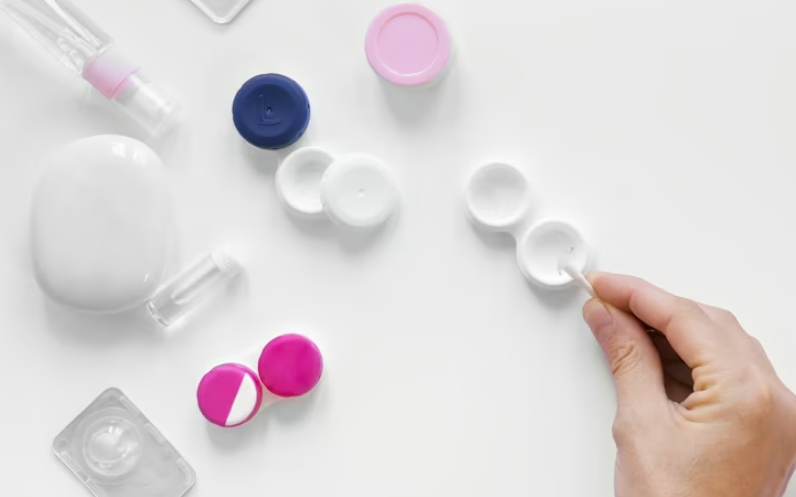
Hydrogen Peroxide
Hydrogen peroxide solutions work similarly to multipurpose solutions but are more liable to harm your eyes if care is not taken. First, you must never apply the mixture to your eye directly.
The solution also uses a special case that helps to convert the mixture to saline. Without its special casing, you might experience burning and redness after a while of using this disinfecting and cleaning solution.
The solution is for contact wearers that react to preservatives. If you also experience dryness when your contact replacement schedule is about to be concluded, then you also need this system. In the same light, if you have an allergy to multipurpose solutions, you can use this version. Here are the specific things to note concerning hydrogen peroxide solution.
- Carefully follow all instructions on the label.
- Put the lenses in their special case with fresh solution. Similar to the multipurpose system, don’t mix the fresh and old or used solution.
- Depending on the label’s instructions, wait at least 4 to 6 hours before inserting your soft contacts.
- Never rinse your contacts with hydrogen peroxide-based solutions and directly insert them into your eyes, as this can cause burning, stinging, and redness. Remember to wait for a few hours.
Rigid Gas Permeable (RGP) Care Systems
The contact lens solution for rigid gas permeable lenses is different from care systems used with soft contact lenses. Hard contact lenses typically require several different solutions for wetting, cleaning, and disinfecting.
If you wear hard contact lenses, talk to your eye care provider about which care system is the best contact solution for you. Never use a hard contact lens solution on soft contact lenses.
How Do You Use Contact Solution?
Two things matter regarding proper use; cleaning and storing contact lenses.
- Cleaning: The recommended method to for cleaning every contact lens type is to rub and rinse. You should also only use a cleaning solution for this procedure. If, in any case, you are using a ‘no rub’ lens, your doctor will inform you of this. That is why it is best to visit an eye doctor before you use any lens. Note also that cleaning should come before and after use.
- Storage: Ensure that your lenses are fully submerged in the solution during storage. Use fresh solution every time you put your lenses away—don’t reuse any of the solutions that have remained in the case.
Check some of our contact lenses without prescription
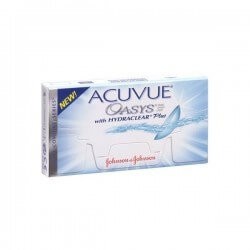
ACUVUE OASYS contact lenses no prescription
Acuvue Oasys: Ultimate Comfort with HYDRACLEAR PLUS Discover the comfort of Acuvue Oasys contact lenses, empowered by HYDRACL...
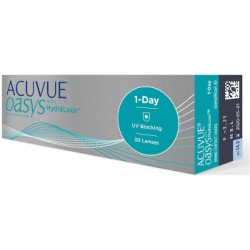
Acuvue® Oasys 1-Day with HydraLuxe™
Acuvue Oasys 1-DAY 30 contact lenses with HydraLuxe Imagine wearing contact lenses when you’re out in the sun. It sounds...
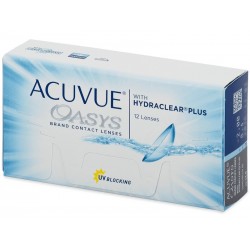
Acuvue Oasys 12 contact lenses
Order ACUVUE OASYS 12 contact lenses without a prescription verification
Conclusion
When your contact lens is properly cared for, you can be sure that they are free from infection, and, most of all, will keep your eyes healthy.
But despite everything, only a certified eye care provider can choose the best contact lens care system that will work best for you and your needs. So if you want to choose the right solution, it would be best to talk to your eye doctor. Nonetheless, this article can serve as your guide.
Read also:
How to Prevent Vision Problems and Defect

